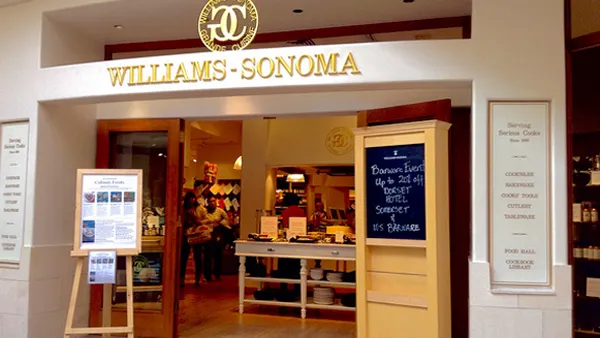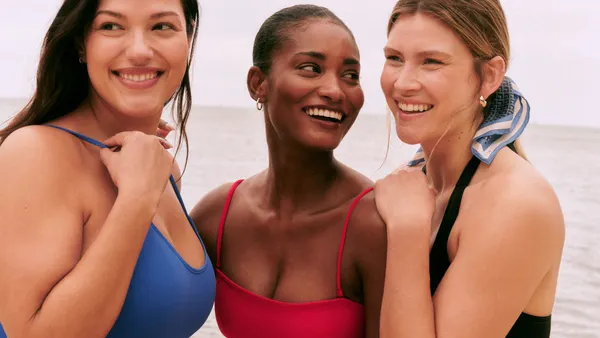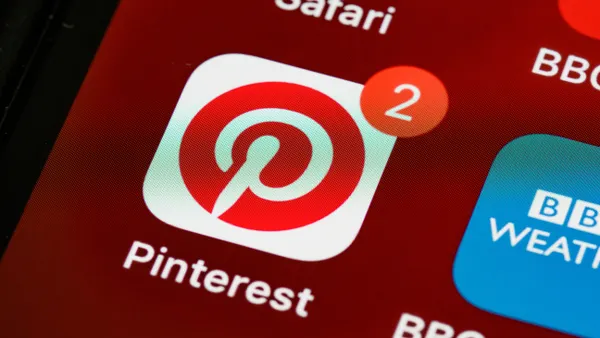Dive Brief:
- Victoria’s Secret may be suffering from a disconnect between its brand position and the #MeToo movement, according to branding analytics firm YouGov. After reaching a high "Buzz score" of 31 among shoppers aged 18-49 in early 2016, the brand has tumbled to 23, according to the latest data from the YouGov BrandIndex. YouGov's "Buzz score" measures whether consumers hear positive or negative things about brands from friends and family, the news and advertising.
- The number of women in that demographic that report buying from the brand is also at its lowest since 2013, according to YouGov’s survey. Last month the brand reported a 1% same-store sales decline, on top of a 3% decline in the year-ago period.
- YouGov researcher Paul Hiebert also pointed to a new low in ratings of the brand’s televised fashion show, which aired about a month after multiple sexual harassment reports came out against film producer Harvey Weinstein. Ratings fell 30%, which Hiebert said was “a new low for the broadcast.” Despite that, YouGov’s report wasn’t all bad for the brand, more U.S. women aged 18-49 say they'd be proud to work for Victoria's Secret than embarrassed and a third expressed an openness to shopping there.
Dive Insight:
YouGov links the rise of the #MeToo women’s empowerment movement with Victoria’s Secret’s decline, although the rise of fitness and the increasing importance of fit are likely also factors.
The #MeToo movement ushered in an era of change sparked by a cascade of sexual harassment and assault revelations in a broad range of industries — including retail — that had far-reaching impacts. As part of the ripple effect these changes have had, the importance of brand perception and brand behavior has increased. Consumers, particularly women, are increasingly paying attention to what brands stand for. Victoria's Secret's falling YouGov scores may indicate that it is out of step with where at least some of its female consumers are.
Beyond brand perception, the brand's slide can also be attributed to fashion misses as more consumers gravitate to streamlined, comfortable styles amid changing attitudes about body image.
Improvements to assortment will be key, as shoppers are finding such apparel at plenty of other brands, including American Eagle's Aerie, Gap's new Love brand and online upstarts like True & Co, Lively and Thirdlove. Stitch Fix this week also unveiled an add-on category for its women's boxes called Stitch Fix Extras, a curated collection of camisoles, shapewear, underwear, tights, bralettes, bras and socks featuring brands like Wacoal, Free People and Hanky Panky as well as the company's private label, Everyday by Stitch Fix.
"'Sexy' is no longer a well-received message," Jane Hali & Associates told Retail Dive in an email last month. "Consumers are looking for intimates that are comfortable and fit properly. Women are seeking comfort and to feel comfortable in their own bodies."
Those players are in focus at Cowen & Co., and analysts there said that the competitive landscape is a worry for L Brands. "While these companies are small in comparison to Victoria's Secret, we do acknowledge their presence could disrupt the lingerie category somewhat, over time," according to a note emailed to Retail Dive.
In an analyst call last month Stuart Burgdoerfer, CFO of parent L Brands said "Turning to 2018, we're very focused on improving performance in the Victoria's Secret business, staying close to our customer, improving the customer experience in stores and online, and improving our assortments in compelling new product launches."













